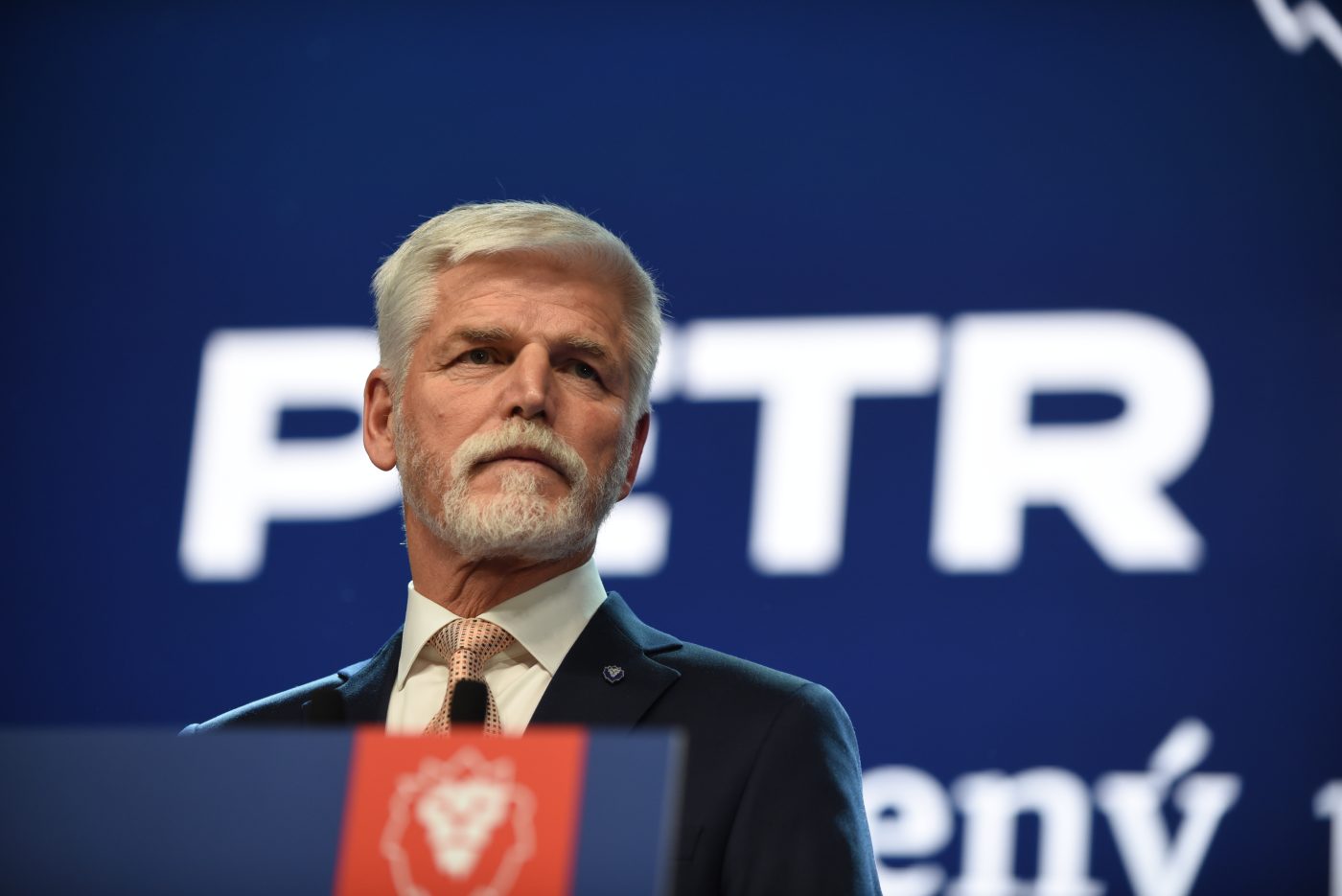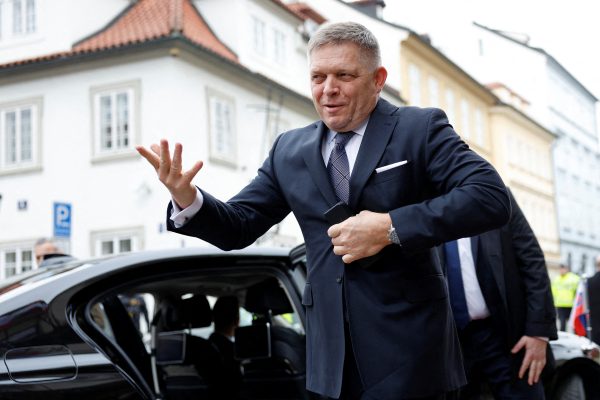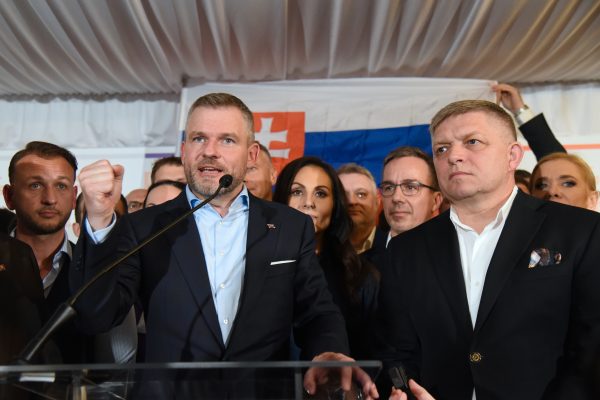Pavel’s swearing-in promises to be a grand affair. After dining with outgoing head of state Miloš Zeman, the president-elect will take his oath in the Vladislav Hall of Prague Castle, under whose soaring stone vaults the coronation banquets of Bohemian kings were once held.
The event will be attended by both chambers of parliament; massive screens specially installed in the castle’s main courtyard will broadcast the event to gathered crowds. Overlooking the courtyard is the royal balcony from which the president will then address the nation, echoing Václav Havel’s famous speech in late December 1989 after the collapse of communism and his election as president.
Like Havel, Pavel will assume office at a time when all eyes are fixed on eastern Europe. With war raging in Ukraine, the Czech Republic hosts the highest number of Ukrainian refugees per capita in the world. The war had been a major point of contention during the election: Pavel’s main opponent, former premier Andrej Babiš, claimed the ex-general and chair of NATO’s military committee, would drag the country into conflict with Russia. Pavel’s landslide victory, however, showed that Czech public opinion is still very much on the side of Ukraine (and savvy enough to discount misinformation.)
Pavel’s schedule is designed to underscore the highly symbolic nature of his inauguration. In line with custom, Pavel will lay flowers by the statue of erewhile professor and independence campaigner T.G. Masaryk, the first president of Czechoslovakia. He will then return to the castle to drink a glass of wine with his invitees — an event from which the increasingly frail Zeman has excused himself, despite his lifelong love of liquor. Finally, the atheist but traditionalist Pavel will take part in a Te Deum and prayer at Saint Wenceslas Chapel within the castle. The ornately decorated area contains the tomb of the Czechs’ main patron saint and leads to a chamber containing the country’s crown jewels.
But this process is not simply ceremonial. It makes statements about the country’s mood and its political future. While the inauguration may seem exaggerated in a parliamentary democracy, whose Prime Minister serves as the head of government, the office of the president comes with considerable powers. He or she appoints judges to the Constitutional Court and members of the Czech National Bank Board. He also has the power to declare amnesties and award pardons, a privilege that has sparked controversy under all three past presidencies. The most recent scandal involves Zeman’s pardoning of his close friend Miloš Balák for manipulating a 200m koruna ($9m) public tender; Zeman argued that Balák had not enriched himself and that no damage had been incurred. Partly in response to this controversy, Pavel has stressed that he will only use presidential pardons “for humanitarian and exceptional reasons.”
Most importantly, the president is responsible for appointing the Prime Minister and other government ministers. According to critics, Zeman abused this power on multiple occasions by refusing to approve names submitted for his consideration — a situation unforeseen by the country’s constitution. It is unclear what stance Pavel will take on this issue. He has signaled that he would “intensively discuss” controversial ministerial appointments but would do so “behind closed doors,” a rebuke of Zeman’s practice of turning his grievances into public feuds.
The most noticeable change Pavel will bring to Prague Castle is foreign policy. Until the all-out Russian invasion of Ukraine in February 2022, Zeman was a staunch defender of Russia, visiting Moscow only a year after the annexation of Crimea and urging Ukraine to accept its loss of the peninsula. When Czech intelligence found that Russian agents had been involved in the explosion of an ammunition warehouse in the Czech Republic, killing two Czech citizens, Zeman muddied the waters by claiming there were multiple versions of events.
The outgoing president also cultivated relations with China. A frequent guest in Beijing, Zeman welcomed Xi Jinping in Prague on the first visit of a Chinese head of state to the Czech Republic. His attempts to attract Chinese investment, however, led to some curious results. Ye Jianming, chairman of the China Energy Company and Zeman’s honorary advisor, was detained in China on corruption charges, portending significant damage to China’s economic flagship in the Czech Republic. Since then, Zeman’s overtures to China have been mixed with criticisms of its low investment in the country.
In contrast, Pavel’s presidential campaign emphasized his Western credentials as a former senior NATO officer. Pilloried as a warmonger by his opponent Babiš, Pavel found himself on the defensive over his vocal criticisms of Russia. Following his election, he has stayed his course and even dialed up his rhetoric by urging that Ukraine be provided with all weaponry barring nuclear weapons. He also ruffled feathers in China with a phone call to Tsai Ing-wen, subsequently declaring that “China is not, at the moment, a friendly country.”
What the president says matters. While foreign policy officially falls under the purview of the Ministry of Foreign Affairs, the head of state has always had a platform in this area. Václav Havel, a dissident under the Communist regime, was a significant asset to the country’s soft power in the West. His friendship with Madeleine Albright and a trip to Washington in 1990 helped put Czechoslovakia on the map of a new post-communist Europe, paving the way for the Czech Republic’s NATO accession. In contrast, Havel’s successor Václav Klaus delighted in goading the European Union (EU) with words and action — whipping up a storm when he wielded his veto to stop the Lisbon Treaty. Although his one-man mission to impede further EU integration failed, Klaus’s refusal to answer calls from the EU President briefly made him the most sought-after man in Europe.
Continuing this activist tradition, outgoing president Miloš Zeman frequently threw his weight behind his foreign policy priorities, including close ties with Russia and China.
Pavel’s rhetoric shows that he intends a pro-Western trajectory for the Czech Republic, something very much in accordance with the government of Prime Minister Petr Fiala (the Czechs are a top 10 contributor in Ukraine aid.) At least until the next parliamentary elections in 2025, therefore, the presidency and the government will be on the same page — a momentous shift after 20 years of tepidity towards the West in the halls of Prague Castle. For Russia, this is not necessarily a surprise: the Czech Republic has been on its list of enemy countries ever since the diplomatic rift over Russia’s 2014 sabotage of the Vrbětice ammunition warehouses, and the government’s expulsion of scores of Russian officials from an embassy viewed as an espionage center. Pavel’s election confirms that relations are at rock bottom.
While China’s relations with the Czech Republic are not yet as icy, Pavel’s election is a clear signal that relations are poor and worsening.
Foreign Minister Lipavský recently met the Tibetan government in Indian exile, bringing the now-familiar denunciations from China, and the planned visit of Markéta Pekarová Adamová, President of the Chamber of Deputies, to Taiwan will doubtless prompt a similar response. Meanwhile, the Czech University of Defense has signed an agreement with Taiwan’s National Defense University.
At some point, we should expect a hostile response.
Ladislav Charouz is a master’s student in International Relations at the University of Oxford. He earned his bachelor’s degree in history and English and a master’s degree in history from Yale University. He has interned at CEPA, Brookings, European Values, and ICDS.
Europe’s Edge is CEPA’s online journal covering critical topics on the foreign policy docket across Europe and North America. All opinions are those of the author and do not necessarily represent the position or views of the institutions they represent or the Center for European Policy Analysis.





